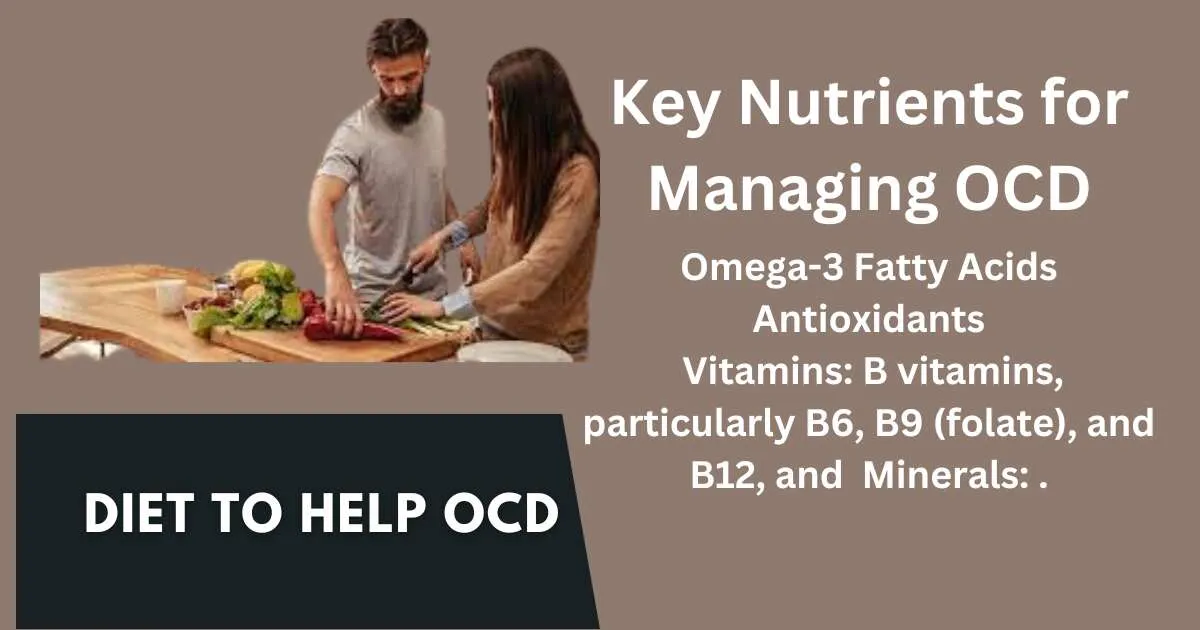Managing OCD Symptoms: The Role of Diet and Lifestyle Choices
Diet to help OCD is a mental health condition characterized by intrusive thoughts (obsessions) and repetitive behaviors (compulsions). These obsessions and compulsions can significantly disrupt daily life, affecting work, relationships, and overall well-being.
The Role of Diet in Managing OCD
While medication and therapy are commonly used to treat OCD, research suggests that diet can also play a crucial role in managing symptoms. What we eat can impact brain chemistry, mood, and overall mental health, making dietary interventions a promising avenue for individuals with OCD.
Key Nutrients for Managing OCD
Certain nutrients have been linked to improved mental health and may help alleviate symptoms of OCD. These include:
- Omega-3 Fatty Acids: Found in fatty fish like salmon and walnuts, omega-3s have anti-inflammatory properties and support brain function.
- Antioxidants: Foods rich in antioxidants, such as berries, dark chocolate, and leafy greens, help reduce oxidative stress and protect brain cells.
- B Vitamins: B vitamins, particularly B6, B9 (folate), and vitamin B12, are involved in neurotransmitter synthesis and may help regulate mood.
- Minerals: Magnesium and zinc play essential roles in brain function and may help reduce anxiety and compulsive behaviors.
Foods to Include in an OCD-Friendly Diet
Incorporating nutrient-dense foods into your diet can support mental health and potentially alleviate OCD symptoms. Some foods to consider include:
- Fatty Fish: Salmon, mackerel, and sardines are rich sources of omega-3 fatty acids.
- Berries and Other Antioxidant-Rich Foods: Blueberries, strawberries, and spinach contain antioxidants that support brain health.
- Leafy Greens and Whole Grains: Kale, spinach, quinoa, and brown rice provide essential vitamins and minerals.
- Lean Proteins: Legumes, turkey, tofu and chicken provide protein without being overly satiating.
- Nuts and Seeds: Almonds, walnuts, and flaxseeds are excellent sources of omega-3s and other nutrients.
- Probiotics: These “good” bacteria are in yogurt and fermented foods like kimchi, sauerkraut, and pickles. Probiotics can help balance the gut microbiome, which improves mental health.
- Magnesium: This mineral is found in green leafy vegetables, nuts, and seeds and helps lower anxiety and improve sleep. Magnesium also helps relax the central nervous system (CNS).
Vitamin B12: This vitamin is essential for brain health, and low levels may increase anxiety. and Vitamin B-12 (cobalamin) plays an essential role in red blood cell formation. - Tryptophan: This amino acid is found in foods like turkey, eggs, and cheese and may help the body produce serotonin. Serotonin is a neurotransmitter that plays a role in mood regulation, and studies show that it helps reduce OCD symptoms. and
Tryptophan is an amino acid that is essential for normal growth in infants and the production and maintenance of body proteins, muscles, enzymes, and neurotransmitters.
Foods to avoid or limit
Some foods may exacerbate OCD symptoms or negatively impact mental health. It’s essential to be mindful of
-
- Processed Foods: High in refined sugars, unhealthy fats, and additives, processed foods can contribute to inflammation and mood swings.
- High-Sugar Foods: Sugary snacks and beverages can cause blood sugar spikes and crashes, affecting mood stability.
- Caffeine and Alcohol: Stimulants like caffeine and depressants like alcohol can disrupt sleep patterns and worsen anxiety.
- Foods High in Artificial Additives: Artificial sweeteners, preservatives, and flavor enhancers may trigger or exacerbate OCD symptoms in some individuals.
Consuming probiotic-rich foods like yogurt, kefir, and sauerkraut may promote a healthy gut microbiome and potentially alleviate symptoms of OCD.
Creating a balanced meal plan
Developing a well-rounded meal plan that includes a variety of nutrient-rich foods is essential for managing OCD symptoms effectively. Consider working with a healthcare professional or registered dietitian to create a personalized eating plan tailored to your needs.
Incorporating mindful eating practices
Practicing mindfulness during meals can help individuals with OCD develop a healthier relationship with food. By eating slowly, savoring each bite, and paying attention to hunger and fullness cues, you can promote a sense of control and reduce anxiety around eating.
The Impact of Lifestyle Factors
In addition to diet, other lifestyle factors can influence OCD symptoms. Regular exercise, adequate sleep, and stress management techniques like meditation and deep breathing exercises can complement dietary interventions and improve overall well-being.
Consulting a healthcare professional
While dietary changes can be beneficial for managing OCD, it’s essential to seek guidance from a healthcare professional before making significant alterations to your diet. A healthcare provider or mental health professional can offer personalized recommendations based on your specific needs and medical history.
Case Studies and Success Stories
Many individuals have found relief from OCD symptoms through dietary changes and holistic approaches. Real-life experiences and success stories can provide inspiration and encouragement for those exploring dietary interventions as part of their treatment plan.
Conclusion of Diet to Help OCD
Incorporating a balanced diet rich in essential nutrients and mindful eating practices can be a valuable adjunct to traditional OCD treatment methods. By nourishing your body and mind with wholesome foods and adopting healthy lifestyle habits, you can take proactive steps towards managing OCD and improving your overall quality of life.
FAQs related to Diet to Help OCD
What role does diet play in managing OCD?
Diet can influence brain chemistry and mood, potentially affecting OCD symptoms.
Can certain foods worsen OCD symptoms?
Yes, processed foods, high-sugar foods, and caffeine may exacerbate OCD symptoms in some individuals.
How long does it take to see improvements in OCD symptoms with dietary changes?
The timeline for improvement varies depending on individual factors, but consistent dietary changes can lead to gradual symptom relief over time.
Is there a specific diet plan recommended for OCD?
While there’s no one-size-fits-all diet for OCD, focusing on whole, nutrient-dense foods and avoiding triggers like processed foods is generally beneficial.
Can supplements help in managing OCD symptoms?
Some individuals may benefit from supplements like omega-3 fatty acids or B vitamins, but it’s essential to consult with a healthcare professional before starting any new supplements.

